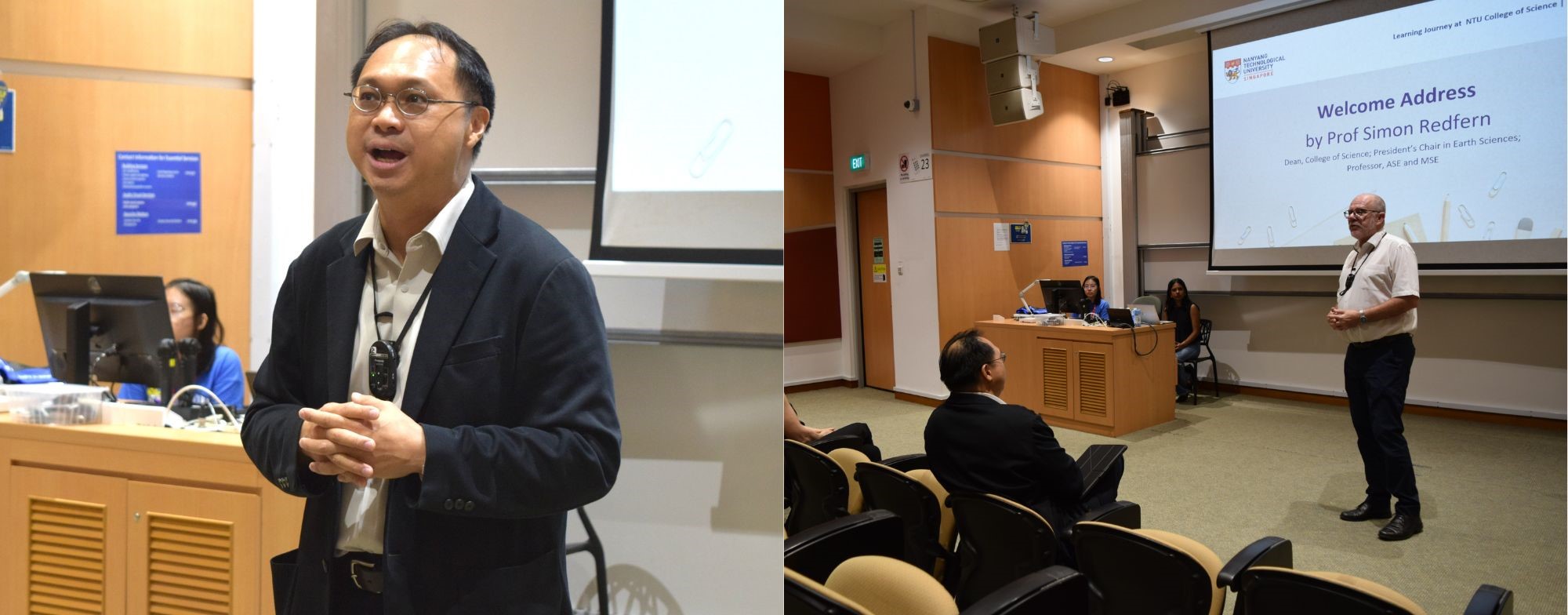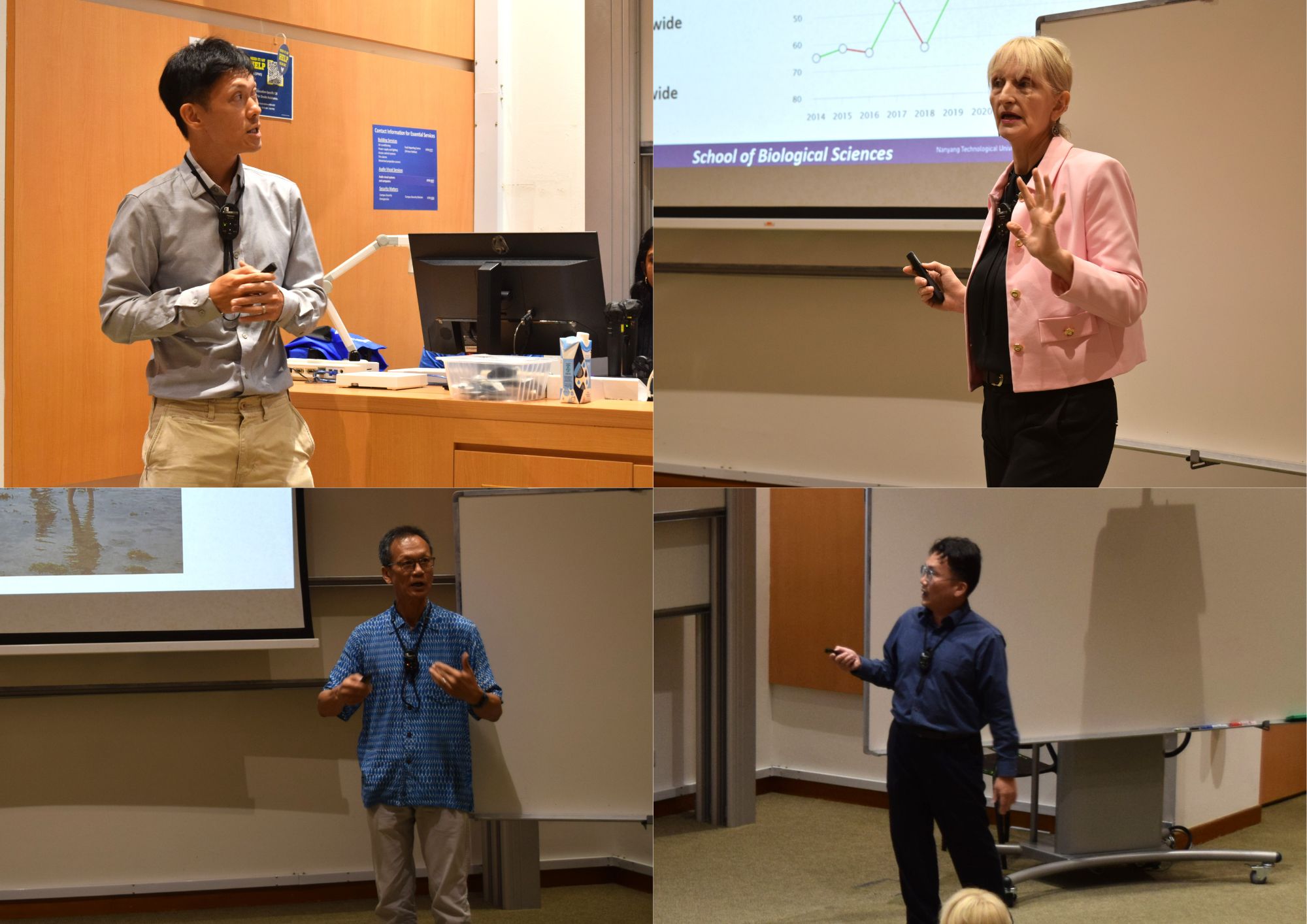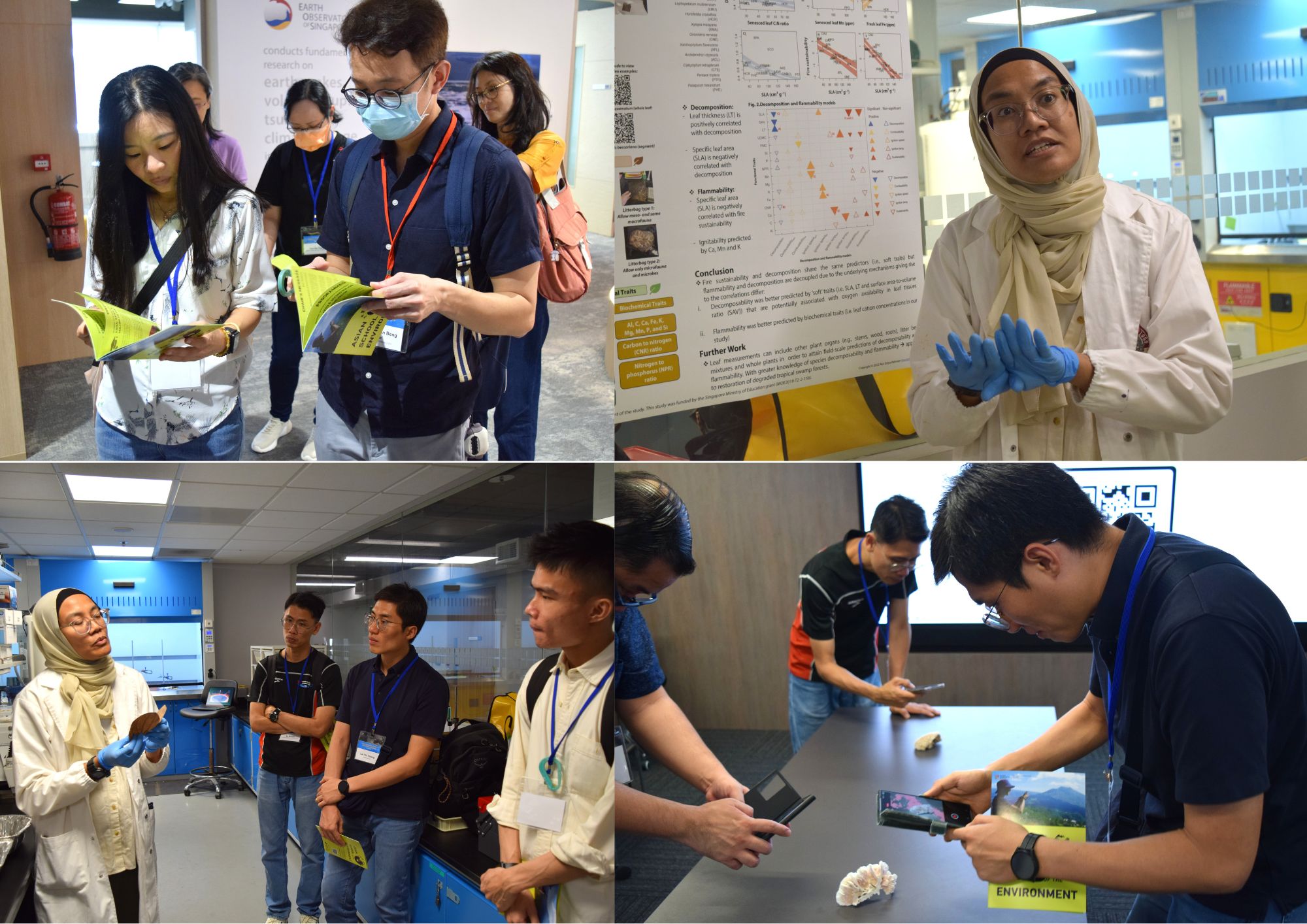On 25 June 2025, clusters of school educators gathered in quiet anticipation for a day of discovery and exchange.
The Learning Journey for Educators to NTU College of Science (CoS), now in its 4th edition, felt like a time of reunion and rediscovery. Hosted by NTU’s Institute of Advanced Studies (IAS), the Learning Journey saw 79 pre-university and secondary school educators from across 20 different Junior Colleges, Polytechnics and Secondary Schools gathered to explore the evolving world of science education across four NTU CoS schools: the School of Physical and Mathematical Sciences (SPMS), the School of Chemistry, Chemical Engineering and Biotechnology (CCEB), the School of Biological Sciences (SBS), and the Asian School of the Environment (ASE).

Prof Sum Tze Chien (Left) and Prof Simon Redfern (Right) set the tone with reflections on
science education and educator impact.
Prof Sum Tze Chien, Director of IAS, opened the morning with warmth and candour. Acknowledging NTU alumni in the audience, he described IAS as a “catalytic platform” and thanked educators for shaping future scientists. “The journey begins with you,” he reminded the audience, underscoring the vital role teachers play in nurturing curiosity and resilience in students.
Prof Simon Redfern, Dean of the College of Science, built on this sentiment. Reflecting on the College’s youthful eighteen-year history, he emphasised that while the world of science is rapidly transforming, fuelled by AI, globalisation, and evolving expectations, the College’s mission remains clear: to deliver globally relevant science education. “The world has come to NTU,” he concluded with a gentle smile.

NTU faculty leaders sharing their insights in teaching and innovation.
[From top left clockwise]: Associate Professor Soo Han Sen (CCEB), Dr Ardina Gruber (SBS), Prof Ng Keng Meng (SPMS) and Dr Shawn Lum (ASE).
The heart of the morning’s programme featured insightful presentations by esteemed NTU faculty, each sharing innovative teaching methodologies and forward-looking curricula:
Prof Ng Keng Meng (SPMS) presented the university’s mathematics and physics programmes, emphasising how the curriculum directly prepares students for career success. He highlighted robust skills highly valued by employers and introduced innovative methods such as game-based learning and interdisciplinary course pairings.
Assoc Prof Soo Han Sen (CCEB) engaged the audience interactively, transforming the lecture theatre into a dynamic classroom with live quizzes. He showcased the school’s interdisciplinary curriculum, enriched by internships, international exchanges, and industry partnerships. Assoc Prof Soo stressed the importance of soft skills and shared vibrant examples of student-led innovation, from fermentation projects to biomaker spaces.
Dr Ardina Gruber (SBS) delivered an insightful exploration of SBS’s growth, spotlighting its strong emphasis on practical, hypothesis-driven biological research. She introduced the transformative Work-Study Degree Programme, preparing students directly for professional roles, and discussed innovative teaching methods including blended learning and flipped classrooms.
Dr Gruber underscored the importance of critical thinking, interdisciplinary collaboration, and adaptive learning technologies.
Dr Shawn Lum (ASE) delivered a compelling reflection on the ASE’s Environmental Earth Systems Science programme through the “heart-head-hands” educational approach. He passionately shared how immersive fieldwork helps students build deep personal connections to the environment, enabling them to thoughtfully and practically address pressing ecological challenges.
Through stories of coral reefs and Taiwanese forests, he called for deep emotional connection to the environment, especially in the face of eco-anxiety among youth.
 MOE and NTU leaders discuss the future of science education with the educators in attendance. The panel discussion moderated by Prof Sum Tze Chien, featured our four faculty presenters, along with Mr Darren Wong, Principal Director (Science) at the Ministry of Education (MOE) Singapore.
MOE and NTU leaders discuss the future of science education with the educators in attendance. The panel discussion moderated by Prof Sum Tze Chien, featured our four faculty presenters, along with Mr Darren Wong, Principal Director (Science) at the Ministry of Education (MOE) Singapore.
The panel discussion and Q&A segment candidly explored current dilemmas in science education: balancing economic utility with curiosity and civic literacy, shifting from rote learning to transferable skills, and engaging parents and the public in educational transformation.
Key takeaways emerged clearly: student attitude, communication skills, and curiosity matter far more than rote memorisation alone. As one panellist aptly summarised, “We can’t give students everything but we can curate, we can guide.”

Informal discussions spark connection and collaboration during the lunch break.
Following the morning sessions and a refreshing lunch break, educators enjoyed guided tours highlighting each school’s cutting-edge facilities and distinctive educational strengths:
 Educators visit CCEB’s research spaces, designed with safety, advanced instrumentation, and thoughtful planning to support a large student cohort. Features like the central chemical corridor enable seamless research and foster collaboration.
Educators visit CCEB’s research spaces, designed with safety, advanced instrumentation, and thoughtful planning to support a large student cohort. Features like the central chemical corridor enable seamless research and foster collaboration.
School of Chemistry, Chemical Engineering, and Biotechnology (CCEB) showcased state-of-the-art research facilities, including advanced NMR spectrometers and X-ray diffractometers. These facilities demonstrated significant advances in data acquisition and analysis, rigorous safety protocols, and extensive hands-on training.
 Introducing educators to the Psi Lab and other spaces which house robust tools for the students to use. The wall of 3D printers was especially admired by visiting educators.
Introducing educators to the Psi Lab and other spaces which house robust tools for the students to use. The wall of 3D printers was especially admired by visiting educators.
The School of Physical and Mathematical Sciences (SPMS) shared insights into their newly established labs supporting flexible postgraduate programmes. Educators observed advanced manufacturing tools, including 3D printers and semiconductor testing equipment, and explored lively student-led innovation projects with practical, real-world applications.
 A live demonstration of advanced laboratory tools and techniques, gaining firsthand insight into research workflows and student learning environments.
A live demonstration of advanced laboratory tools and techniques, gaining firsthand insight into research workflows and student learning environments.
School of Biological Sciences (SBS) presented powerful research infrastructure, including advanced NMR spectroscopy and mass photometry tools, reflecting their commitment to leading-edge biological sciences education and research excellence.
 Exploring diverse technologies and methodologies in environmental analysis, including photogrammetry for creating 3D models from photos, during hands-on sessions in the Sedimentation and Ecology Lab.
Exploring diverse technologies and methodologies in environmental analysis, including photogrammetry for creating 3D models from photos, during hands-on sessions in the Sedimentation and Ecology Lab.
Asian School of the Environment (ASE) introduced educators to immersive laboratory facilities, highlighting extensive field-based education. ASE’s passionate commitment to environmental stewardship and global ecological research was evident through interactive presentations on projects spanning local ecosystems to international conservation efforts.

As the day drew to a close, there was a sense of shared purpose and inspiration. The 2025 Learning Journey to NTU’s College of Science offered more than a tour; it provided educators with firsthand experience of innovative approaches in science education, from experiential learning and interdisciplinary research to creative pedagogy.
Participants left not only with practical resources for their students, but with renewed perspectives on how science can be taught and learned, and how curiosity, collaboration, and continual learning shape the future of science education.
Some feedback from the educators:
“All of the presentations are informational, and provide a good overview to current directions of university courses to align with students’ future career aspirations readiness or national’s socioeconomic needs.”
“Dr Shawn Lum’s presentation rekindled my love for Geography & Ecology!”
“The presentations were crisp and succinct, and were complemented with good lab tours taking into account the sharing of pedagogical ideas.”
“The visits to the various research and analytical labs which were an eye-opener.”
“The lab visits to CCEB to understand how practical lessons are run at the university-level for large cohorts is insightful.”
